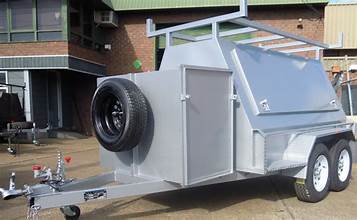Have you been thinking about upgrading your equipment transport? Choosing the right trailer can make all the difference in your daily operations. This article is about helping you identify the critical factors when buying a trailer designed to carry heavy equipment. Let’s explore the key considerations to choose your needs best.
Assess the Build Quality
Durability is critical when transporting heavy equipment, as the wear and tear on a trailer can be significant. Look for tradesman trailers for sale built with strong materials like galvanised steel or heavy-duty alloys, which offer excellent resistance to stress and corrosion.
Inspect features such as reinforced frames, high-quality welding, and durable flooring, as these impact the trailer’s strength and reliability. These details might seem small but they significantly affect its overall performance and longevity. Never compromise on quality when your equipment’s safety and peace of mind are on the line.
Evaluate Your Equipment’s Load Capacity
Start by evaluating the type and weight of the equipment you plan to transport. Not all trailers are built for the same loads, and exceeding their capacity can lead to severe issues like structural damage or breakdowns.
Consider the total weight, including tools, attachments, and any additional cargo you may need to haul. A robust trailer should handle your current needs and potential future demands as your workload grows. This ensures your investment remains practical and cost-effective in the long run.
Choose the Right Size and Design
The size and layout of the trailer match your work requirements and equipment dimensions. Larger ones provide more space for heavy machinery and additional cargo but may require a heavier towing vehicle, which could increase your fuel costs. On the other hand, compact ones are easier to maneuver in tight spaces but might limit what you can carry at one time.
When evaluating designs, consider accessibility and storage options. Does the trailer include features like ramps, lockable compartments, or side access doors? A well-designed trailer should meet your current needs and improve loading and unloading efficiency, saving you time and effort on every job.
Consider Towing Requirements
Your towing vehicle is vital in selecting the right trailer, as compatibility is essential for safe and efficient transport. Check your vehicle’s towing capacity to avoid overloading, which can strain the engine, brakes, and suspension system.
The trailer’s hitch, braking system, and weight distribution should align with your vehicle’s specifications to ensure smooth and stable handling. Safety is paramount, so check for proper alignment between the trailer and your towing vehicle.
Evaluate Safety Features
Transporting heavy equipment comes with inherent risks, so safety features should be a top priority when choosing a trailer. Look for the ones equipped with reliable braking systems, durable tie-down points, and well-placed lighting to ensure visibility on the road.
Additionally, anti-slip flooring or coatings should be considered to prevent accidents during loading and unloading. Investing in these elements ensures the safety of your equipment and the well-being of anyone handling or transporting the load.
Think About Maintenance and Upkeep
A trailer is a long-term investment, so determining maintenance requirements is essential for hassle-free ownership. Some models demand frequent servicing, while others are designed to require minimal upkeep over time, saving you both money and effort. Check for features like rust-resistant coatings, replaceable parts, and accessible components that simplify routine maintenance tasks.
Choosing the right trailer for heavy equipment involves careful planning and attention to detail. Every element makes this investment worthwhile, from understanding load capacity to evaluating safety features. Explore tradesman trailers for sale that meet your requirements while offering the reliability and durability needed for years to come. A well-chosen trailer will simplify your work, protect your valuable equipment, and ensure long-term operational success.






